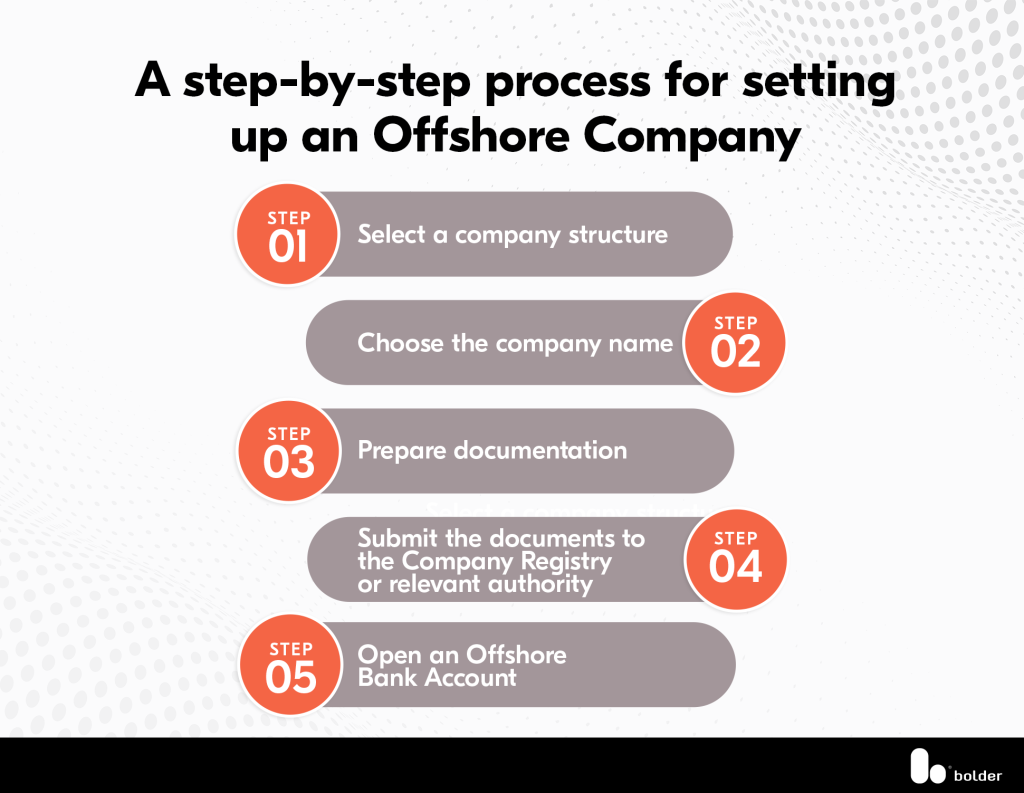Checking Out the Solutions Offered in Offshore Firm Formations: What You Need to Know
Offshore business formations offer a variety of solutions made to assist in company success while making certain conformity with lawful needs. These services can consist of company registration, lawful suggestions, and arrangements for privacy via candidate directors. Additionally, factors to consider around tax obligation optimization and property protection are vital. Understanding these elements can significantly influence one's decision-making process. However, the intricacies of choosing the appropriate territory and steering through regulations increase additionally questions. What should one think about next?
Understanding Offshore Firm Structures
What defines an offshore business structure? An overseas company is generally registered in an international jurisdiction, commonly identified by favorable governing settings and discretion. These frameworks are made to supply legal splitting up in between the business's assets and its proprietors, allowing a series of monetary and functional benefits. Offshore business can be developed as different kinds, including limited liability business (LLCs), corporations, or depends on, depending on the regulatory structure of the selected jurisdiction.
Trick features of these frameworks consist of improved personal privacy, possession security, and ease of worldwide organization transactions. Furthermore, they usually need marginal regional existence and can help with the administration of financial investments throughout borders. The option of a details offshore territory can greatly affect the functional abilities and compliance needs of the business. Generally, understanding the details of offshore business structures is crucial for business owners and financiers seeking to optimize their service techniques.
Tax Obligation Advantages of Offshore Firms
Offshore companies offer considerable tax advantages that can enhance profitability and monetary effectiveness for service owners. One of the main advantages is the possibility for reduced business tax obligation rates, which can be especially less than those in the owner's home nation. Many offshore territories offer tax incentives, such as tax holidays or exemptions on particular sorts of income. Furthermore, overseas companies may benefit from positive tax treaties, enabling for the decrease or removal of withholding taxes on rewards, royalties, and interest. This can bring about boosted capital and better reinvestment possibilities. Some overseas entities can run under a territorial tax system, which just taxes income created within that territory. This structure can be especially advantageous for companies participated in worldwide profession or on the internet solutions, allowing them to maximize their tax obligations while preserving conformity with global regulations. On the whole, these tax obligation advantages can greatly contribute to long-lasting economic success.
Personal Privacy and Privacy Functions
How can entrepreneur secure their delicate information while benefiting from worldwide possibilities? Offshore business formations use robust privacy and discretion attributes that attract entrepreneurs looking for discretion (Offshore Company Formations). Numerous territories offer candidate services, permitting people to appoint 3rd parties as supervisors or shareholders, therefore concealing their identifications from public documents
Furthermore, rigorous data protection regulations in various overseas territories assure that sensitive information continues to be confidential. Offshore companies often benefit from improved banking privacy, with laws that safeguard customer identities and monetary deals.
Additionally, making use of private addresses for signed up offices reduces direct exposure to public analysis.
These privacy steps enable service owners to run with greater confidence, recognizing their sensitive data is safe and secure. By leveraging these features, business owners can focus on critical development chances without the continuous concern of details exposure.
Possession Security Strategies
While steering through the complexities of worldwide service, business owners have to prioritize possession defense to secure their wide range from prospective threats. Offshore firm formations offer robust approaches for minimizing exposure to legal cases, creditor actions, and political instability. One effective technique includes developing a limited responsibility firm (LLC), which divides individual possessions from organization responsibilities, therefore providing a shield versus suits.
In addition, entrepreneurs can make use of trusts to hold properties, guaranteeing they continue to be safeguarded from lenders and lawful disputes. Jurisdictions with solid asset protection laws, such as Nevis or the Chef Islands, are frequently favored for their desirable regulations. Carrying out proper insurance coverage and expanding investments additionally improves safety and security, lessening vulnerability to market changes. Generally, making use of these strategies within an overseas framework not only promotes riches conservation however additionally promotes long-lasting monetary stability, enabling business owners to concentrate on development and technology without unnecessary issue over possession exposure.

Opening Offshore Financial Institution Accounts
Opening offshore savings account entails understanding the different account kinds readily available, which can deal with different financial requirements. In addition, the documents process is necessary, as it usually needs certain kinds of identification and proof of house. This overview will clarify the find out choices and needs for people and businesses looking for to develop offshore financial connections.
Account Kind Used
Offshore bank accounts can be found in various types, each made to satisfy various monetary demands and objectives. Individual accounts are customized for people looking for personal privacy and property security, while corporate accounts assist in company deals and management of company funds. Multi-currency accounts are popular among worldwide financiers, permitting deals across various currencies without excessive conversion costs. Additionally, cost savings accounts supply passion on deposits, attracting those seeking to expand their assets securely. Some banks also give financial investment accounts, giving clients access to various investment opportunities. Each account type might come with distinct benefits and attributes, enabling customers to choose the one that lines up ideal with their monetary strategies and purposes. Recognizing these choices is essential for efficient offshore banking.
Required Documentation Refine
To efficiently open up an offshore savings account, potential customers have to prepare a collection of details documents that satisfy regulatory requirements. This commonly consists of a valid ticket or government-issued identification to validate identity. Clients are likewise needed to provide evidence of home, such imp source as an utility bill or financial institution declaration, dated within the last 3 months. Additionally, a thorough summary of the resource of funds is necessary to assure conformity with anti-money laundering laws. Some financial institutions might request an organization strategy or recommendation letters, particularly for company accounts. Each jurisdiction may have one-of-a-kind demands; subsequently, talking to an expert in overseas solutions is suggested to identify all paperwork is accurate and total, assisting in a smoother account opening procedure.
Compliance and Regulative Factors To Consider
Steering the intricacies of conformity and regulatory factors to consider is necessary for any entity going after offshore business formations. Entities must stick to various global and regional legislations that control monetary activities, taxation, and corporate governance. Secret laws usually include anti-money laundering (AML) legislations, recognize your client (KYC) protocols, and coverage needs to guarantee openness.
Business must continue to be alert about modifications in special info regulations that might affect their operational standing. Failure to conform can cause extreme charges, including penalties or the dissolution of the company. Engaging with financial and lawful experts who focus on offshore regulations can give crucial assistance in steering via these ins and outs.
In addition, understanding the effects of tax obligation treaties and worldwide agreements is basic for maintaining compliance. Companies should focus on establishing durable compliance frameworks to reduce risks and assure lasting sustainability in their overseas ventures.
Selecting the Right Offshore Territory
Exactly how does one determine one of the most ideal offshore jurisdiction for firm formation? The choice of jurisdiction is crucial and entails several factors. One should examine the legal structure and guidelines governing companies in possible territories. Beneficial tax regimes, such as reduced or absolutely no company tax obligations, are typically a key factor to consider. Furthermore, the political security and online reputation of the territory play significant roles in guaranteeing the defense of properties and compliance with worldwide requirements.
Furthermore, the ease of access of financial services and the simplicity of working needs to not be forgotten. A territory offering robust privacy provisions can also be helpful for those seeking privacy. Assessing the prices associated with business formation, upkeep, and potential legal charges is important. By weighing these aspects, one can make a notified decision, making sure that the selected overseas territory aligns with their business objectives and functional requirements.

Regularly Asked Inquiries
Exactly how Long Does the Offshore Company Formation Process Normally Take?

The offshore company formation process typically takes anywhere from a couple of days to several weeks. Offshore Company Formations. Variables affecting this timeline consist of territory, documents completeness, and specific service providers associated with the development process
What Are the Initial Expenses Associated With Establishing an Offshore Firm?
The initial prices for setting up an offshore business can differ commonly, typically including registration charges, legal expenses, and service charges for services like savings account setup and compliance, often totaling a number of hundred to several thousand dollars.
Can People Kind Offshore Companies Without Professional Support?
People can practically create overseas companies individually; nonetheless, they typically experience complex legal and regulatory requirements. Offshore Company Formations. Specialist support is advised to navigate these difficulties effectively and assure conformity with appropriate legislations and guidelines
What Documents Are Required for Offshore Business Registration?
The papers required for overseas firm enrollment usually consist of recognition evidence, a comprehensive service plan, evidence of address, and, in some territories, an affirmation of helpful ownership and resolutions from supervisors.
Exist Ongoing Upkeep Costs for Offshore Companies?
Recurring upkeep charges for overseas business are usually needed to ensure conformity with regional guidelines. These costs may consist of yearly revival costs, registered representative services, and bookkeeping, varying by territory and details company structure.
